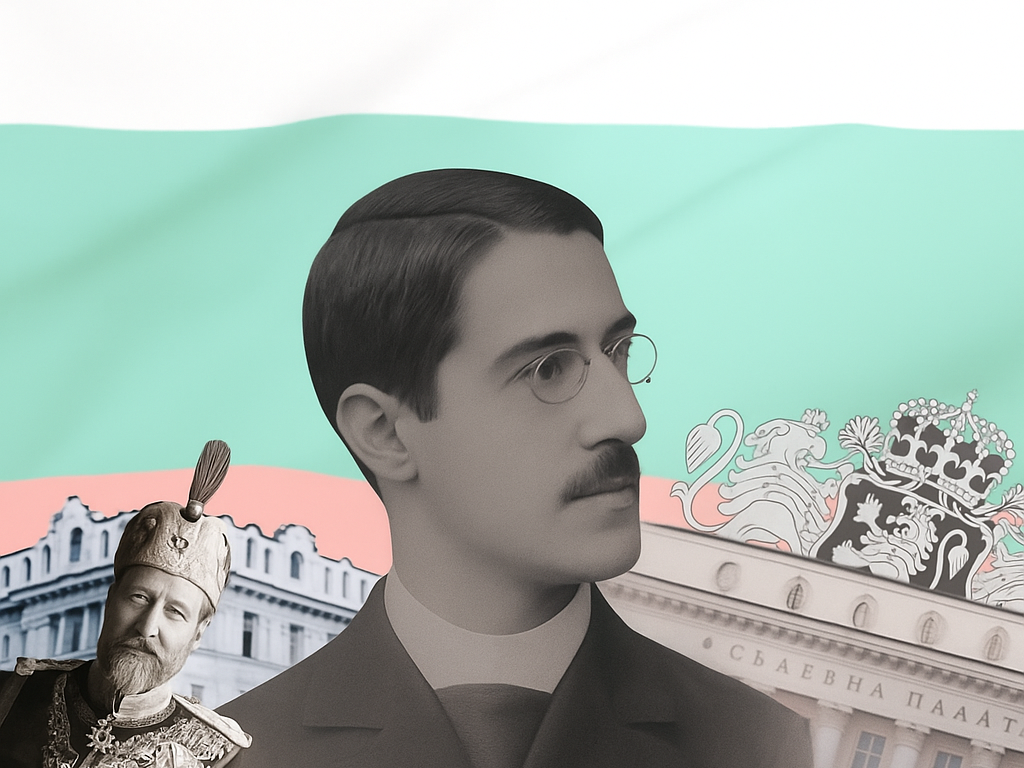
Table of Contents
Who was Todor Ivanchov?
When we think about the history of law, it’s easy to focus only on the big countries like Britain, France, or the United States. But smaller nations like Bulgaria also went through fascinating struggles to build a fair legal system after gaining independence. One person right in the middle of this process was Todor Ivanchov (1858–1906) – a politician, lawyer, and eventually Bulgaria’s Prime Minister. His career is a reminder of how closely law and politics are tied together, and how even leaders themselves must answer to the law.
A Legal and Intellectual Beginning
Todor Ivanchov was born in Veliko Tarnovo, a historic city that had once been the capital of the Bulgarian Empire but was, during his youth, part of the Ottoman Empire. Like many ambitious young Bulgarians, he sought education abroad. He studied at Robert College in Istanbul, a famous American-founded school that trained many of the Balkans’ future leaders, and later continued his studies in Montpellier, France.
This education gave him more than just academic skills. It exposed him to Western legal and political thought: ideas about constitutions, parliamentary systems, and how modern states should be governed by law rather than personal rule. When he returned to Bulgaria, he brought these influences with him, ready to shape a young country still finding its identity after liberation from Ottoman rule.
From Education Minister to Prime Minister
Ivanchov first entered government as Minister of National Enlightenment (essentially the education minister). His legal background mattered here too, because education policy was tied to questions of rights, citizenship, and the role of the state. He believed that strengthening schools was key to building not just smarter citizens but also a more lawful, democratic society.
His big break came in 1899, when he was appointed Prime Minister of Bulgaria. At the same time, he also took on the role of Minister of Finance. This put him in charge of both the country’s money and its legal-political direction – a powerful but very difficult combination.
Law, Taxes, and Unrest
As Prime Minister, Ivanchov tried to bring order to Bulgaria’s government. He introduced reforms in the civil service, aiming to make it more professional and less corrupt. This was a very “legal” way of thinking: he wanted administration to be guided by clear rules, not by favoritism or connections.
But not all of his decisions were so well received. Most famously, his government reintroduced the medieval tithe tax (a 10% tax on agricultural produce). Legally, this was within his powers, but politically it backfired badly. Bulgarian peasants, who made up the majority of the population, saw this as unfair and outdated. Their anger led to widespread unrest.
This clash is a perfect example of the tension between law on paper and law in practice. Just because something is legally possible does not mean it is wise or just in the eyes of the people. Ivanchov learned this lesson the hard way.
On Trial: No One Above the Law
Perhaps the most fascinating chapter in Ivanchov’s life came after he left office. In 1903, he was put on trial for constitutional violations linked to decisions made while he had been part of Stefan Radoslavov’s government years earlier.
This trial was groundbreaking in Bulgaria. For the first time, it showed that even top politicians could be held legally accountable. Ivanchov was found guilty and sentenced to eight months in prison. Although he was later pardoned, the fact that he was convicted at all sent a powerful message: the law applies to everyone, even former Prime Ministers.
From a legal history perspective, this moment is huge. It marked a turning point where Bulgaria’s young legal system showed signs of maturity – not perfect, but willing to test whether leaders could be restrained by the constitution.
Legacy: A Complicated but Important Figure
Todor Ivanchov’s legacy is mixed. On the one hand, his government is remembered as weak and unpopular, mainly because of the tithe tax and the unrest it caused. On the other hand, he represents the lawyer-politician figure who believed in using legal frameworks to modernize his country. His trial after leaving office is perhaps the most lasting part of his story: a reminder that governments must answer to the constitution, not just to their own authority.
For a country like Bulgaria, still new to independence, this was a valuable lesson. Ivanchov’s career may have ended in controversy, but it showed both the strengths and weaknesses of law in a young democracy.
Why Ivanchov Matters for Us Today
So, why should we care about a Bulgarian Prime Minister from over 100 years ago? Because Todor Ivanchov’s story teaches us something timeless: law and politics cannot be separated. Leaders make laws, but they must also obey them. And when leaders ignore the law, courts and constitutions are the tools societies have to hold them accountable.
For young people curious about law, Todor Ivanchov is a reminder that legal history isn’t just about famous lawyers or judges. It’s also about politicians, their mistakes, and how societies respond when power goes too far.
Curious to find out more? Check out the Ministry of Finance’s official website! and our article on the Rule of Law to find out what it looks like in modern-day Bulgaria

